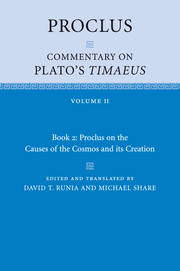II - Introductory Matters: 214.13–223.2:
Published online by Cambridge University Press: 30 June 2022
Summary
Invocation of the Gods
But indeed, Socrates, this is what all those who share in even a modicum of good sense do. When venturing on any matter, even if it is insignificant, they always in some way call on God. (27c1–3)
Exegesis of the text: 214.17–217.3
You see what kind of subject (hupothesis) Plato has entrusted to Timaeus, what kind of listener he has furnished him in the person of Socrates, what kind of beginning of his discourse he has outlined. The subject matter extends to the whole work of creation. The listener is in a state of readiness to concur with him [Timaeus], being of one mind [together] and focused on the single investigation of the All. This is the reason he himself summons Timaeus to prayer (cf. 27b8). The beginning of the discourse, in taking its point of departure from the invocation of the gods, truly imitates the procession of beings, who first remained among the gods and only in this way have obtained the process of birth from them.
But since it is commanded that all those who share in even a modicum of good sense should always call on God when setting out on any venture, even if it is insignificant, let us observe then from what mental conception in each case these [men] make this invocation of the gods. In fact, if they are people of good sense, it is surely improbable that they do not take their aim at Being and at the truth concerning the gods themselves. I declare, therefore, that all people grasp hold of the knowledge concerning the gods in the true manner, when they (a) apply a pure mind to the investigation, (b) build up their store of what is noble and good in the excellences of the soul, and not in human concerns or external contingencies, and when they (c) observe the power of providence penetrating the whole of reality and bringing all things into harmony with the universe, in order that both the whole and its parts be in the best possible state and nothing be without share in the concern that extends from the gods to each individual thing.
- Type
- Chapter
- Information
- Proclus: Commentary on Plato's Timaeus , pp. 50 - 60Publisher: Cambridge University PressPrint publication year: 2008

